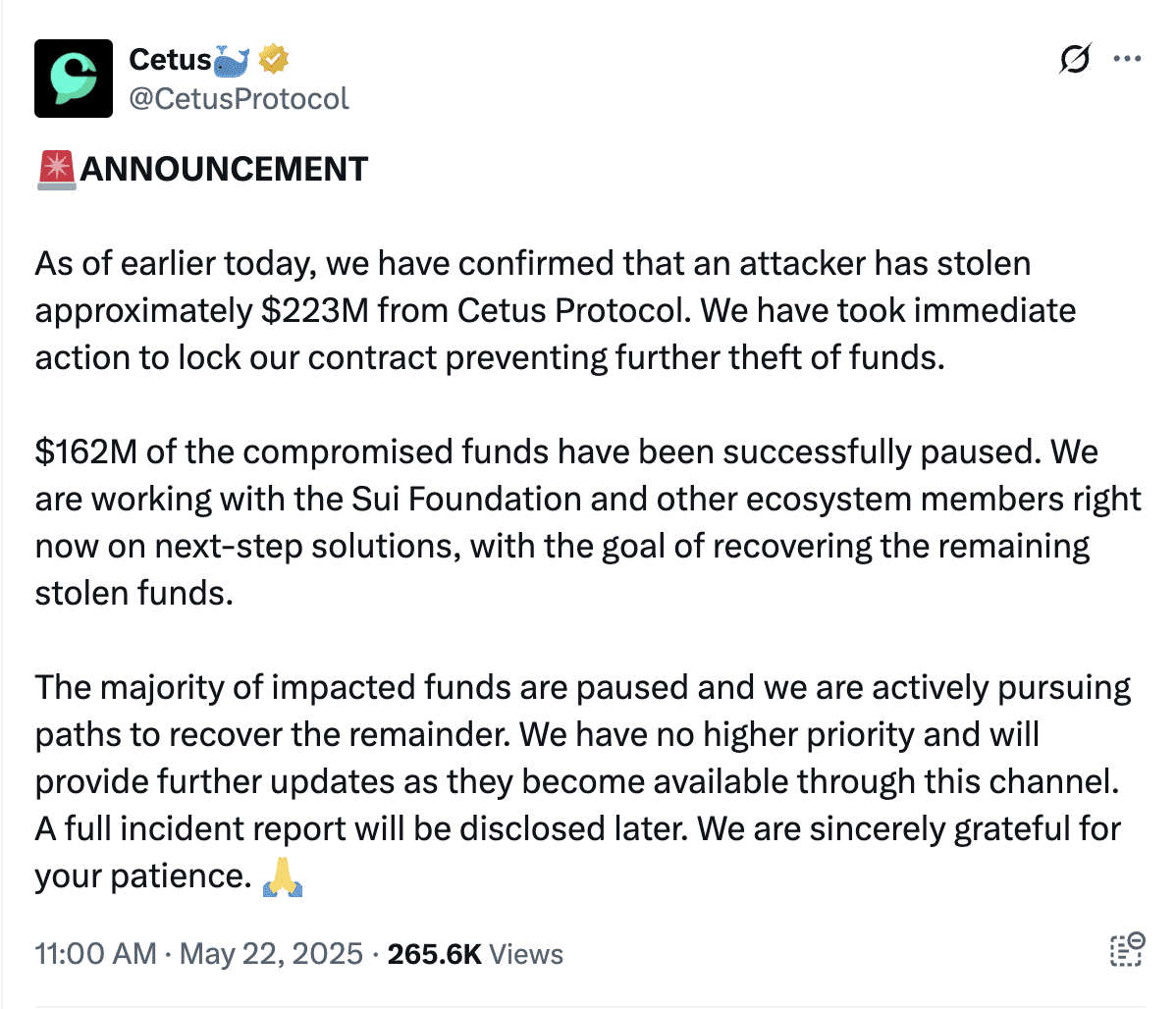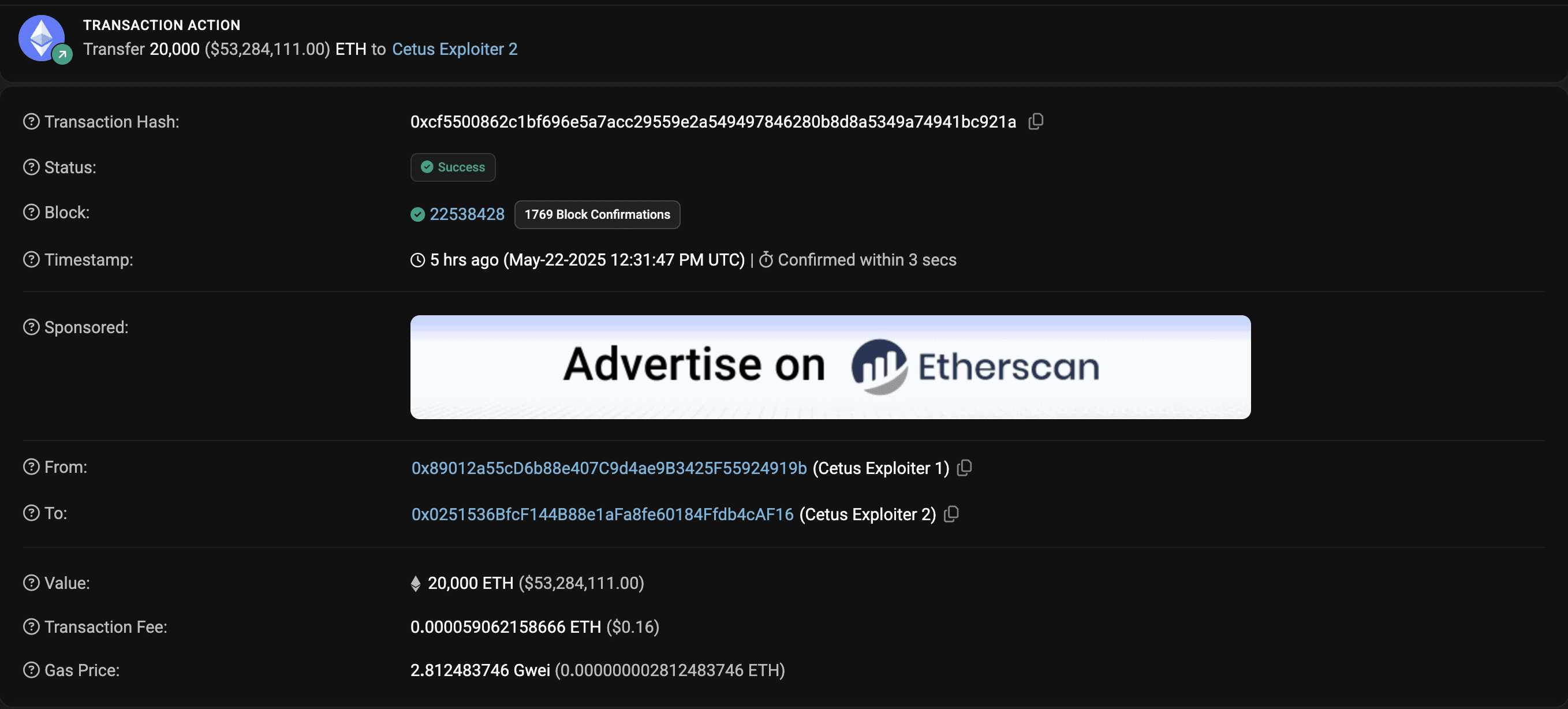Cetus Hack: Sui Network Validators Freeze Majority of Stolen Funds
In a significant development following the $220 million hack of Cetus, a decentralized exchange (DEX) built on the Sui blockchain, the Cetus team announced that approximately $162 million of the stolen funds have been successfully frozen. This action was made possible through the collaborative efforts of Sui validators and the Sui Foundation.
The Cetus team is actively working with the Sui Foundation and other ecosystem participants to recover the remaining funds. The Sui Foundation confirmed that a large number of validators identified the addresses associated with the stolen funds and are actively blocking transactions from those addresses until further notice. This move aims to prevent the further movement and potential laundering of the stolen assets.
This incident underscores the ongoing challenges surrounding cybersecurity in the crypto and Web3 space. As the industry continues to evolve, the need for robust security measures and collaborative responses to exploits becomes increasingly crucial.

The Timeline of the Cetus Exploit
The Cetus hack occurred on May 22nd, when the DEX suffered a significant exploit believed to be related to vulnerabilities within its smart contract code. The attack resulted in an estimated loss of $223 million in user funds.
Following the initial breach, security researchers at Extractor Web3 reported that approximately $63 million of the stolen funds were bridged to the Ethereum network. This transfer further complicated recovery efforts, as it involved moving assets across different blockchain ecosystems.
The Extractor team also identified a specific wallet address used by the attackers to launder a substantial amount of Ether (ETH). Approximately 20,000 ETH, valued at around $53 million, were transferred to a wallet address ending in “AF16”.

Community Reactions and Decentralization Concerns
The response to the recovery efforts and the asset freeze within the Sui ecosystem has been varied. While many in the crypto community applauded the successful freeze of funds, others raised concerns about the level of centralization implied by validator intervention. Some critics argue that the ability of a relatively small number of validators (reportedly 114) to freeze wallets raises questions about the censorship resistance and overall decentralization of the Sui network.
Key Takeaways from the Cetus Hack
- Significant Financial Impact: The Cetus hack resulted in the theft of approximately $223 million in user funds, highlighting the substantial financial risks associated with DeFi platforms.
- Validator Intervention: Sui validators played a crucial role in freezing $162 million of the stolen funds, demonstrating the potential for collaborative security measures within blockchain ecosystems.
- Decentralization Debate: The validator-led freeze sparked debate about the trade-offs between security and decentralization, raising questions about the extent to which validators should have the power to control user funds.
- Cross-Chain Complications: The bridging of stolen funds to the Ethereum network underscores the challenges of tracking and recovering assets across different blockchain ecosystems.
- Need for Enhanced Security: The incident emphasizes the critical need for enhanced security measures, including robust smart contract audits and proactive monitoring, to mitigate the risk of future exploits in the DeFi space.
Impact on the Sui Ecosystem
The Cetus hack has undoubtedly had a significant impact on the Sui ecosystem. The incident has raised awareness about the security risks associated with DeFi platforms and has prompted discussions about the need for improved security measures. The quick response of Sui validators and the Sui Foundation in freezing a significant portion of the stolen funds has demonstrated the commitment of the Sui community to protecting its users.
Looking Ahead: The Future of DeFi Security
The Cetus hack serves as a stark reminder of the importance of robust security measures in the DeFi space. As the industry continues to grow and evolve, it is essential that developers, exchanges, and users alike prioritize security to mitigate the risk of future exploits. This includes conducting thorough smart contract audits, implementing multi-factor authentication, and regularly monitoring for suspicious activity.
The incident also highlights the need for greater collaboration among different players in the crypto industry to combat cybercrime. By sharing information, resources, and expertise, the industry can collectively strengthen its defenses and better protect users from harm.
Furthermore, the debate surrounding the level of decentralization in the Sui network underscores the importance of striking a balance between security and freedom. While it is essential to have mechanisms in place to prevent and respond to hacks, it is equally important to ensure that those mechanisms do not compromise the fundamental principles of decentralization and censorship resistance.